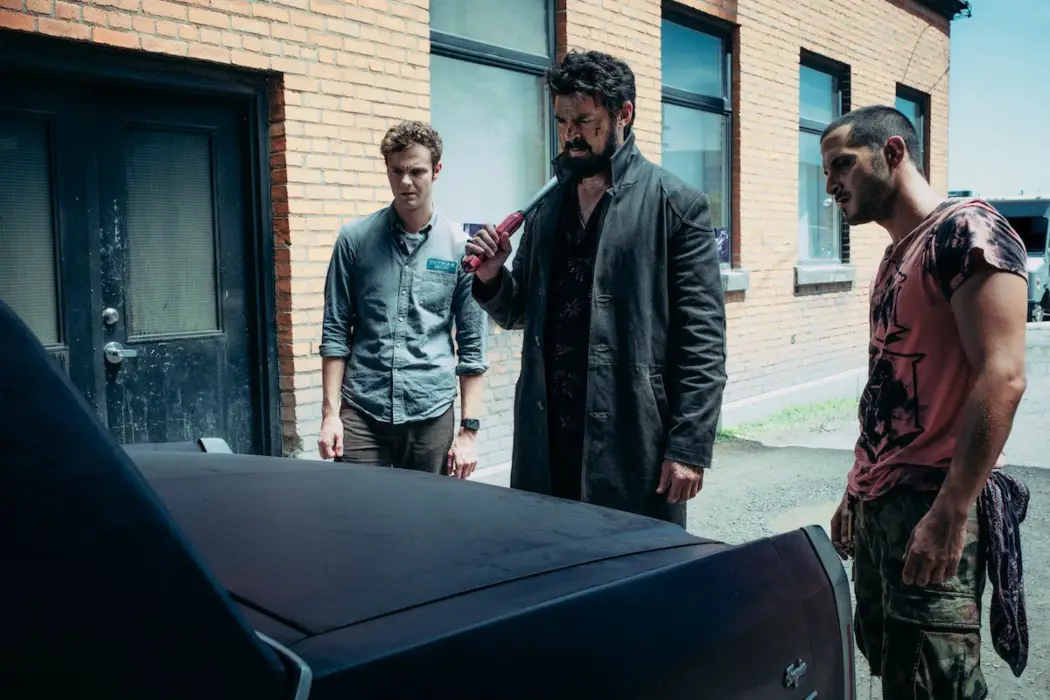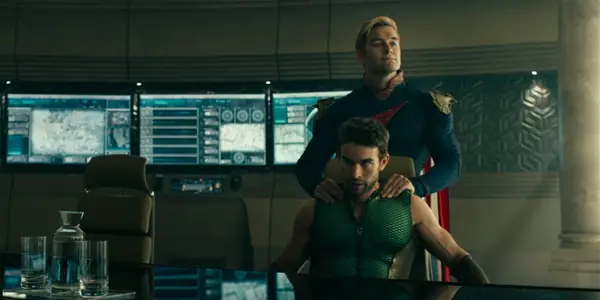THE BOYS (S1E2) “Cherry”: Hughie Breaks Bad

Stop me if you’ve heard this one before. After establishing the main character and his central conflict, The Boys puts his morality to the test. He has an antagonist, in this case the presumed dead Translucent, in captivity and after much deliberation and denial, is forced into an impossible situation. They’ve seen his face, leaving our hero with no discernible option but to kill them, taking a course of action that they can never come back from and leaving their old life behind for good.
If you’re getting flashbacks of Breaking Bad‘s extraordinary third episode “…And the Bag’s in the River”, wherein Walter White commits to his new lifestyle by coldly killing Krazy-8, then you’re not alone. The Boys‘ second episode “Cherry”, named after The Runaways song that plays over the credits, borrows rather a lot from Walt’s decline into darkness, with Hughie’s journey playing out almost beat for beat the same.
And while it’s not the first time this creative team has tipped their hat to Breaking Bad, it is concerning to see The Boys already recycling material from other prestige TV so soon into its run. But it’s also not entirely surprising, considering the well-worn ground the show continues to walk on. Because really, if you’ve seen the likes of Deadpool, Super, Kick-Ass, or any number of “edgy” takes on the superhero genre, the shtick offered up here continues to offer very little in the way of innovation.
Back from the Dead
“Cherry” opens with Hughie and Billy on the move, ready to dispose of Translucent’s corpse, when suddenly their passenger wakes up. Billy asserts that the only course of action is to kill him (he knows who his captors are, after all), but Hughie is less keen to commit cold-blooded murder. He tries to justify keeping Translucent alive, but Billy is having none of it, taking them to see an old friend.
The friend in question is Frenchie (Tomer Capon), an expert in anti-Supe weapons. Naturally, Billy owes him money and the arrival of a very much alive member of the Seven only adds to the tension. It’s here that the episode takes a brief detour into Tarantino homage — as if the ‘visiting an old acquaintance for help disposing of a body’ plotline wasn’t enough, there’s even a sweet trunk shot thrown in for good measure.

As Hughie falls deeper into Billy’s spell, Frenchie is roped into his latest scheme, having also been identified by their new prisoner. He gets to work on a new bullet to pierce Translucent’s invulnerable skin, which of course, doesn’t work. Frustrated, Billy goes out looking for help.
Exhausting All Options
He breaks into the home of Agent Susan Raynor (Jennifer Esposito), an old CIA contact and former fling, in the hopes that she’ll provide him with Translucent’s file. He tries to charm it out of her, hoping to find some weakness he can exploit on their captive Supe. But Raynor can’t risk the heat, and frankly, has had enough of his shit. All out of favors, Billy retreats to Frenchie’s, but not before Translucent has time to get under Hughie’s skin.
In the absence of his more bloodthirsty co-conspirators, Hughie tries to interrogate Translucent, now in a cage, to no avail. The prisoner turns its back on his captor, telling him he’s not cut out for this and reflecting on the nature of killing. Again, it’s nothing that the aforementioned Breaking Bad episode didn’t do better. Hughie’s inner turmoil and its ultimate endpoint feel more like a predetermined conclusion than a genuine conflict, since; a) his hatred of Supes is well established at this point and b) he already delivered what he thought was a killing blow on Translucent in the previous episode (director Matt Shakman does frame this confrontation nicely though, with Hughie being the one who appears trapped when Translucent turns the tables).

His ultimate decision at the end of the episode, therefore, resonates less as a genuine turning point for the character, and more as a necessary plot point. Translucent has to be killed by the episode’s end or else we wouldn’t have six more episodes, but that doesn’t mean the show couldn’t have done more with this story beat. And speaking of things that lack dramatic weight…
A Team-Up from Hell
So… yeah. I previously complained that The Boys has an uncomfortably cavalier attitude towards sexual assault, and found the resolution to that storyline unsatisfying in episode one. But hey, this episode’s description stated that “Starlight gets payback”, so maybe these concerns would be addressed in a meaningful way this time. Or not.
In the absence of Translucent, The Deep is left without a partner for a corporately mandated team-up (an admittedly funny idea), so Vought decides this is the perfect opportunity for Starlight’s big break. She’s understandably uncomfortable with this, but goes along with it, thinking it’s the right thing to do. While staking out their target, a warehouse filled with contraband, the two bicker a little — Deep tells her what happened is no big deal, but she pushes back and tells him she won’t be bullied anymore.
She knows he’s a B-lister, at best, and if he tries anything else she won’t hesitate to fight back. Which on paper could work, but the overall casual approach the show has to this material remains its worst quality. Later in the episode, she has another storyline that involves her stopping a woman from being raped, and is chastised by her bosses for not going through official channels. Which feels like it should provide some emotional catharsis, albeit briefly, but neither Eric Kripke‘s script nor Shakman‘s direction conveys that, leaving it just awkwardly hanging there. However, credit does go to Erin Moriarty for giving these scenes some sense of pathos, even if the writing doesn’t meet her there.
But anyway, the mission turns out to be a hoax, a publicity stunt for the cameras, which adds to Starlight’s increasing frustration with Vought and the Seven’s corporate structure. She longs for the days when she was a simple crime fighter, which does make you wonder why more heroes haven’t just branched off and formed their own teams, free of the corporate backing. Joining the Seven can’t be the be-all and end-all of being a hero, given their limited membership, and the world doesn’t seem as though it’s lacking in Supes. But I digress, Deep seems perfectly aware of this being a setup, content to show off for the cameras and ensure they caught every flashy move he pulled off.
A Crisis at Vought
Contrary to what I previously assumed, Homelander had actually downed the plane on his own accord at the end of “The Name of the Game”, not going off Madelyn’s orders. But she soon finds out when Deep pulls the wreckage out of the ocean, only to find burn marks identical to those caused by Homelander’s laser vision. And she’s furious about it, since now she has to convince a room full of senators that this wasn’t her doing.
One of whom, Senator Calhoun (David Andrews), she’s also attempting a business proposal with. She plans to loan out her heroes to the US military, altering the power balance of the world and lining her pockets along the way. He’s hesitant, but Madelyn blackmails him by having Doppelganger (Dan Darin-Zanco) pose as his lover and take pictures of him sleeping with a man. The show tries to handwave this away with a line about homosexuality not being career-damaging anymore, but it can’t shake off the grossness of the whole situation.
Elsewhere, we have Homelander’s increasingly oedipal attraction to Madelyn — his attack on the plane is revealed as an attempt to impress her, while another scene shows him spying on her as she extracts breast milk. Which is… something, at least. It’s certainly more interesting (or at least different?) than the simple “evil Superman” trope the previous episode suggested. Where any of this is going is anybody’s guess, but Anthony Starr certainly sells the hell out of his creepy spying session, in addition to his thinly veiled threat to silence Deep about the plane.

Translucent Goes Boom
Homelander then goes on the hunt for the missing Translucent, who’s now got a bomb up the ass (a plan devised by Frenchie after seeing a turtle on television). He gets close enough so that they can’t set off the bomb for fear of being discovered, but Frenchie has another trick up his sleeve. He blows up his own home, alerting Homelander to the explosion in the distance and giving Hughie time to spray the walls with Translucent’s insides.
Not to keep making the comparison (even though the episode itself isn’t shy of doing so), but the cartoonishness of his death does limit how much the moment can truly resonate, lacking the intimate brutality that Walt’s killing of Krazy-8 had. That combined with the fact that we never doubted he’d go through with it, makes for a serviceable but not particularly compelling end to the episode.
Before he exploded though, Translucent did reveal that A-Train had been with Popclaw, a “real D-lister”, when Robin was killed, and that she might have the answers Hughie needs. So while we did get some leads on our ongoing plot threads, The Boys continues to wallow in its worst tendencies, as it tries to tell a contemporary story with a painfully out of step POV.
Stray thoughts:
- Hughie’s relationship with his dad continues to feel stock, with Simon Pegg being oddly cast as a blandly concerned father.
- There’s a button-pushing gag where A-Train visits a kid with cancer, which feels very South Park circa 1999.
But what did you think of “Cherry”? Was it really too similar to Breaking Bad? Let us know in the comments below!
Watch The Boys
Does content like this matter to you?
Become a Member and support film journalism. Unlock access to all of Film Inquiry`s great articles. Join a community of like-minded readers who are passionate about cinema - get access to our private members Network, give back to independent filmmakers, and more.













